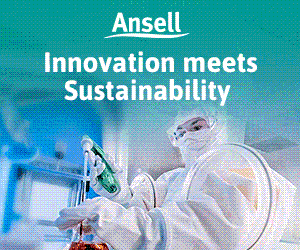Processing purer water
Drinking water filtration system finds a new application in the pharmaceutical process industry
When Schering Plough (Avondale) Company's pharmaceutical manufacturing facility in Ireland looked for a new way to provide process water to its manufacturing facility as well as feedwater to a purified water generation system, it turned to ITT Industries' Sanitaire division for a novel application of its "Fyne" filtration technology to remove colour and other trihalomethane precursors from organic-rich river water. Schering-Plough (Avondale) Company in Ireland is a subsidiary of Schering-Plough Corporation, of the USA, a multinational company engaged in the manufacture of healthcare and pharmaceutical products. The Rathdrum County, Ireland facility, established in 1961, employs 380 people and produces active pharmaceutical ingredients (APIs) using multi-step chemical synthesis. The most important product currently manufactured at the facility is Loratadine, the active ingredient of the allergy medication, Claritin. An important element in producing APIs is water; the more highly purified the better. At the Rathdrum facility, the water source is drawn from a nearby river. The river water, which was also to be used as feedwater to a purified water generation system, was in need of a more efficient system to remove colour and other trihalomethane precursors from the organic-rich river water, thereby enabling the treated product to be used as process water and feedwater in the plant. A novel membrane filtration system from ITT Industries' Sanitaire PCI Membrane unit was proposed as a means to remove the organic material from the river's surface water. Known as the Fyne process, this membrane filtration application is now producing water for this industrial pharmaceutical processing plant; the first such application of the technology outside of the municipal water market.
How it works The Fyne process uses nanofiltration membranes to retain undesired dissolved organic materials (mostly humic and fulvic acids) that, after chlorination, yield undesired disinfection by-products such as trihalomethane and haloacetic acid. The membrane system reduces undesirable levels of iron and other metals, which may also be found in these types of surface water. The membrane also holds back waterborne pathogens, microbes and viruses. The organic compounds that cause the high colour content and disinfection by-products are retained in a small proportion of the raw water known as the concentrate or reject. The systems are simple and automated enough to allow unattended operation, with intervention on no more than a weekly basis for routine operation and maintenance. The system can be monitored continuously and remotely when an outside telephone line is available.
First applications The Fyne filtration process found its first application to clean peaty surface waters in Scotland for municipal supply. Since then, there have been numerous installations of the Fyne process, mostly limited to small surface-derived drinking water systems in Canada and Alaska. There have been successful installations in First Nation communities in British Columbia and Nova Scotia, and the system was tested and verified under the US Environmental Protection Agency Packaged Water Treatment Plant Verification Program at a site in Barrow, AK. Other plants are also being installed in remote Alaskan communities. The Fyne process plant installed at Schering-Plough (Avondale) Company replaces traditional water treatment, using tubular nanofiltration membranes to process 480m3/day. The Fyne filtration plants are delivered in and may continue to operate in a heated and ventilated 40ft container, complete with membrane wash tank, chlorine dosing and contact tanks, and water storage. Fyne tubular systems are exceptionally robust. David Pearson of Sanitaire's PCI unit notes that, "the outstanding record of reliability of the Fyne filtration plants, together with the ability to monitor operation through a remote dial-up connection, means low staffing levels". In addition, the plant has a small footprint that enables civil engineering work to be kept to a minimum. Moreover, the tubular membranes can be cleaned mechanically, using a foam ball technique, so both chemical consumption and discharge of waste are minimal. The Fyne filtration solution was selected on the basis of competitive tender, with Schering Plough (Avondale) Company engaging Honeyman Water as expert consultants to assist in the design, specification and procurement process. According to Pearson: "The choice reflects Schering Plough and Honeyman's confidence in PCI-Water's ability to deliver the optimum technical solution in a timely and cost effective manner." The PCI Membrane Systems unit of ITT Sanitaire specialises in the application of membrane filtration systems. In addition to systems based on tubular membranes for liquids containing suspended, colloidal or viscous materials, PCI also supplies spiralwound or hollow fibre membranes for clean solutions, and ceramic membranes for high chemical compatibility and thermal resistance.
First for filtration Membrane filtration systems, such as the Fyne process, are frequently becoming the first choice in water treatment applications because they provide cost-effective solutions that minimise water use and waste-disposal costs.




